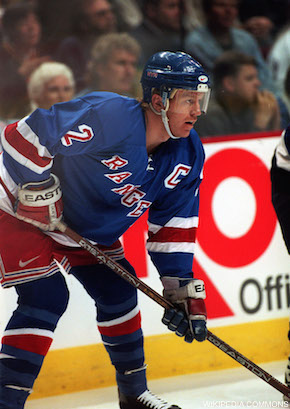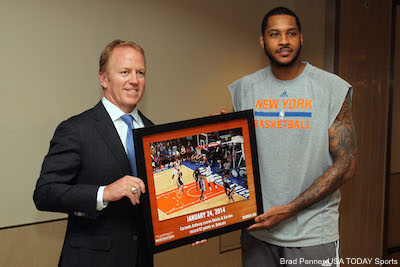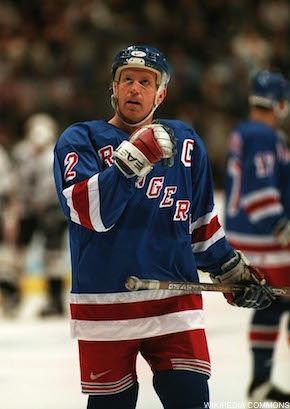Brian Leetch ended the 1991 Canada Cup on the trainer's table, suffering from a hip pointer -- with Mark Messier snickering at him.
"He walked in and said, 'How you doing?'" Leetch says. "I said, 'All right, just getting some treatment.' He said, 'We're happy not to see you out on the ice.'"
Without Leetch that night, the U.S. lost, and Canada won the gold.
This was Leetch's first interaction with Messier. One month later, they were teammates with the Rangers after the Oilers agreed to Messier's trade demand.
"The first practice he came to was right before our first game, so I remember him skating around the ice and he had about a 15-foot buffer zone from any other player skating near him," Leetch says. "I was skating around the other side of the ice with James Patrick and some guys and we said, 'Could you believe Mark Messier's on this team?'"
Before long, Leetch and Messier were road roommates and carpool buddies. Leetch, who is seven years younger, and Messier were the only Rangers living in Manhattan at the time, so they started sharing the drive to practice in Westchester.
"I learned way more from just observing the way he acted in certain situations and the way he responded to people and his teammates and his reactions to different things," Leetch says. "It was the right time in my hockey career for him to become involved with myself, Adam Graves, Mike Richter and a few of us."
Messier took over as captain for the Oilers after Wayne Gretzky's 1988 departure, but his move to New York gave him the chance to have a team of his own. During the Rangers' 1994 Stanley Cup title run, they trailed 3-2 in the Eastern Conference Finals against the Devils. Messier guaranteed a Game 6 victory.
"I laughed and said, 'Look what you got us into now, Mark,'" Leetch says. "He laughed too, but we knew he believed in our team, we knew the New York tabloids would take something, but to see it on the front and back pages everywhere just kind of made us shake our heads. Richter kept us in it for a period and a half and for him to take over late like that, was just amazing."
Messier had a natural hat trick (three straight individual unanswered goals) in the third period. Messier was the clear face of the team, but it was Leetch who won the Conn Smythe Trophy as Stanley Cup Playoffs MVP. He was the first American-born player to win it.
In 1996, the Canada Cup had been rebranded as the World Cup of Hockey, and this time, the U.S. won with Leetch as its captain. Even after losing the opener in the best-of-three series, 4-3, in Philadelphia, the U.S. stormed back with consecutive 5-2 wins in Canada.

"To be able to win two games in Montreal, that was a big stepping stone," Leetch says of the USA Hockey.
The next major international competition was the 1998 Olympics. After winning the World Cup, the Americans had a disappointing finish as Dominik Hasek and the Czech Republic eliminated them in the quarterfinals. One consideration was that the World Cup had been played on NHL ice surfaces, while the Olympics were on the wider European-style rinks. The three medalists at the 1998 Olympics, the first featuring NHL players, were the Czechs, Russians and Finns (who beat Canada for the bronze).
At the 2002 Olympics in Salt Lake City, they used an NHL-sized rink, and the gold-medal game featured the U.S. and Canada. Given what had happened at the World Cup, Leetch says, "We felt like we were defending champs."
Canada prevailed 5-2.
"There was distinct disappointment losing that game and not just excitement getting to the finals," Leetch says.
But winning gold in 1996 and silver in 2002 was proof that the Miracle On Ice of 1980 had inspired the next generation of American hockey. During that era, Leetch was part of a core group that included Rangers teammate Mike Richter, Chris Chelios, Jeremy Roenick, Doug Weight, Mike Modano and others who grew up with hockey dreams fueled by Lake Placid. In 1996, two U.S. players, Brett Hull and John LeClair, were the tournament's only double-digit scorers.
Q&A with Brian Leetch on World Cup of Hockey: http://t.co/PQ0qUlXTvY #WCH2016 pic.twitter.com/LTnuSDmC0l
— NHL (@NHL) September 26, 2015
"I think when you just sat in the locker room and looked at your teammates, each guy coming into his prime on his NHL team or was in that position, there were captains and assistant captains for all NHL teams and guys you had to gameplan against," Leetch says. "We had size, we had strength, guys that could check and face-offs, and we had highly skilled players too."
With the third edition of the World Cup of Hockey coming next fall, Leetch is working with USA Hockey again. He recently met with youth hockey players, coaches and parents at the USA Hockey All-American Prospects game in Buffalo. He took pictures and dished out advice to the attendees, working with Liberty Mutual.
"You see the success of the under-18 teams in international competition and the world juniors," he says. "You see when American teams go into the Olympics and the World Cup next year, the U.S. is seen as co-favorites."

Looking back at the '96 World Cup, Leetch refused to take the leadership credit. He points out Chelios probably would have been captain if not for conflicts leading up to the tournament.
"Once Chris showed up, we said our team's complete now and we had everyone in the roles they wanted to be in and felt comfortable in," he says. "The group was already established before then. You could have put the 'C' on anybody and we would have been fine. I was probably the guy who was as neutral as anyone. There were strong personalities in that room."
In 2016, the guy wearing the 'C' for the U.S. could be another Rangers defenseman. Ryan McDonagh is already the Rangers captain, and the U.S. coach will be John Tortorella, who worked with him for three seasons in New York. Regardless, expectations will be high.
"It's strong up and down the lineup," Leetch says. "The difference is the U.S. goes in believing they should be medaling at worst and the goal is to get to that final game: The gold medal game in the Olympics and the final of the World Cup."
-- Follow Jeffrey Eisenband on Twitter @JeffEisenband.






